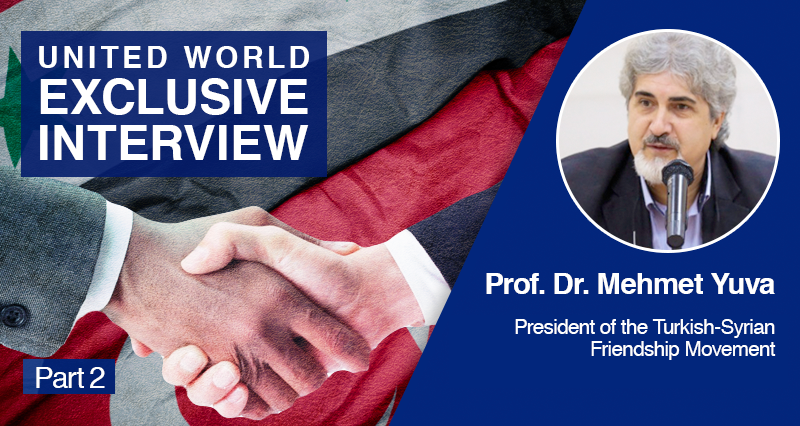Today we publish the second part of the interview with Prof. Dr. Mehmet Yuva, who worked for a long time in the department of history at Damascus University, where he lectured on the history of the US and modern history. Yuva also taught modern history of Cyprus, Türkiye and Syria in the graduate program of the same university. He took an effective role in the establishment of the Turkish Language Teaching Center at Damascus University.
It is possible that Türkiye and Syria will start talks in the near future. What are the issues that should be addressed in these talks and which kind of attitude will be beneficial to both countries?
To eliminate imperialists and terrorist organizations
For Türkiye-Syria cooperation to become a reality, there are essential first steps that need to be taken. Most importantly, and as a prerequisite for extracting and transporting the gas and oil we talked about, it is necessary to eliminate the imperialists in the region. Terror organizations that act together with the imperialists must be eliminated as well.
After that, the people need to be gained and integrated into the institutional framework. People and state need to reconcile and join forces. Following this, the state should utilize the means at its command for the benefit of the nation.
The importance of armies
And armies must be kept strong. Experience has shown that if you don’t have a strong army, neither your natural resources nor factories are of any value. In fact, they first attacked the Syrian army along with the Syrian state. Then they dismantled Syria’s factories in Aleppo and Homs, and took away expensive means of production of the country. They stole Syria’s oil, wheat and cotton.
The two countries can achieve all this together. Trust is the key to success. At this point, Türkiye needs to act very sensitively and carefully. Syria should be supported in all its needs.
“Would be great mistake for Türkiye to…”
In its talks with Syria, it would be a great mistake for Türkiye to try to impose things like “we will force the government to negotiate with the opposition” or “we will build housing in safe zones and bring there a million Syrians from Türkiye”. Türkiye should spend all its efforts on reconciliation with the Syrian state and restoring the institutions of the Syrian state.
As Türkiye, we should ponder on how we can fulfill our responsibilities about Syria. Arrogantly acting as if nothing happened, as if Türkiye did not commit injustices against Syria is not in keeping with the customs and traditions of the Turkish nation.
Time to shatter the Sykes-Picot Agreement
Devlet Bahçeli, the chairman of the Nationalist Movement Party, said, “It is time to shatter the Sykes-Picot Agreement.” How do you evaluate this statement in terms of Türkiye-Syria relations?
Yes. Mr. Bahçeli’s reference to the Sykes-Picot Agreement and the need to shatter it is of historical importance.
Mark Sykes was a British spy and François Georges-Picot was a French spy. They worked for Britain and France in West Asia with important political and military authorities. The subject of the agreement signed in March 1916 by France, Britain and Tsarist Russia was the question of who would own which territories to be emptied by the Ottoman Empire after its collapse. In short, West Asia was partitioned by this agreement between Britain and France.
According to the partition, Iraq and Lebanon and some parts of Syria and Türkiye were to be given to France, the north of Iraq, namely the oil-rich region to Britain, and Palestine was to be administered by the three states of the agreement. Kurdistan and Armenia were to be established in Anatolia. In addition, the treaty granted territory from Western Anatolia to Greece and a Pontos state in the Black Sea, which is in accordance with the dreams of Great Hellas of the Greeks.
In addition to the territories allocated to states, Sykes-Picot also divided countries into ethnic and sectarian parts. Sunni, Alawite, Druze, Kurdish and Turkmen states were to be established in Syria, and a Moorish Catholic state in Lebanon.
In Palestine, the goal was to first build a small Jewish State and then expand it in accordance with Judeo-Protestant ideology. In return for this gift from Britain, the International Zionist Movement offered the efforts of its cadres around the world for Britain’s success in World War I.
Sykes-Picot of the 21st century
In terms of its objectives, Sykes-Picot is the Greater Middle East Project of 100 years ago. The Greater Middle East Project is the 21st century version of Sykes-Picot.
Sykes-Picot has been reenacted in a new form between 2003 and 2022, that is, since the US’ occupation of Iraq. In fact, Bill Clinton had stated this very candidly in his speech to the US Congress in the mid-90s: “The 21st century will be the American century. The work and projects that were left incomplete at the beginning of the 20th century will be completed in the 21st century.” Clinton had also said that Türkiye would play a central role in this regard. The invasion of Iraq and other attacks and occupations in West Asia have revealed what Clinton meant. And as Clinton said, Türkiye has indeed assumed a central role for the US and NATO.
Türkiye-Syria cooperation against Sykes-Picot
It is what it is. As Türkiye, where are we now what will we do? That is the question. Türkiye-Syria cooperation is indispensable for the destruction of Sykes-Picot and to prevent a third Sykes-Picot or a Greater Middle East Project in the future.
Now a new world is being built and the world is heading towards a new international order. In this world, Türkiye should stand with the Oppressed Nations such as Syria, Iraq, Lebanon and Iran.

















Leave a Reply